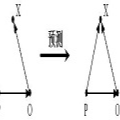Knowledge graph embedding models (KGEMs) are used for various tasks related to knowledge graphs (KGs), including link prediction. They are trained with loss functions that are computed considering a batch of scored triples and their corresponding labels. Traditional approaches consider the label of a triple to be either true or false. However, recent works suggest that all negative triples should not be valued equally. In line with this recent assumption, we posit that negative triples that are semantically valid w.r.t. domain and range constraints might be high-quality negative triples. As such, loss functions should treat them differently from semantically invalid negative ones. To this aim, we propose semantic-driven versions for the three main loss functions for link prediction. In an extensive and controlled experimental setting, we show that the proposed loss functions systematically provide satisfying results on three public benchmark KGs underpinned with different schemas, which demonstrates both the generality and superiority of our proposed approach. In fact, the proposed loss functions do (1) lead to better MRR and Hits@10 values, (2) drive KGEMs towards better semantic awareness as measured by the Sem@K metric. This highlights that semantic information globally improves KGEMs, and thus should be incorporated into loss functions. Domains and ranges of relations being largely available in schema-defined KGs, this makes our approach both beneficial and widely usable in practice.
翻译:暂无翻译




